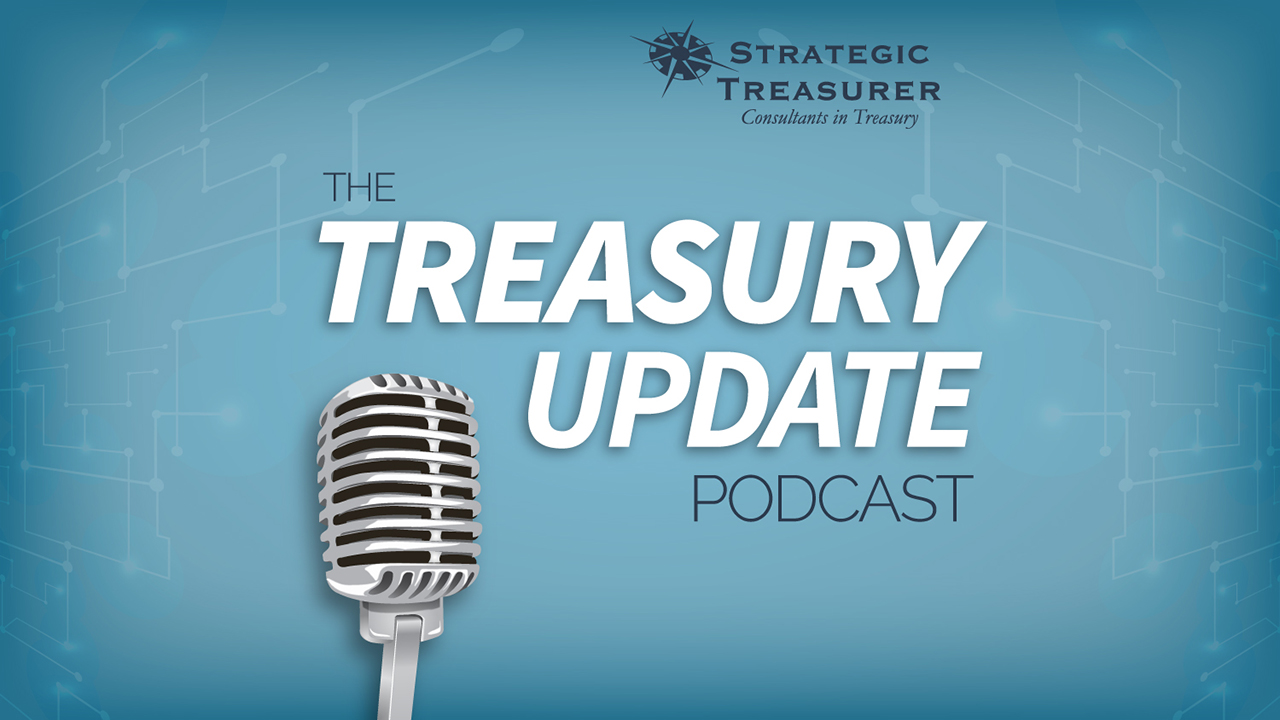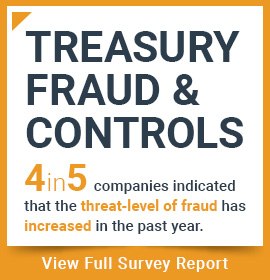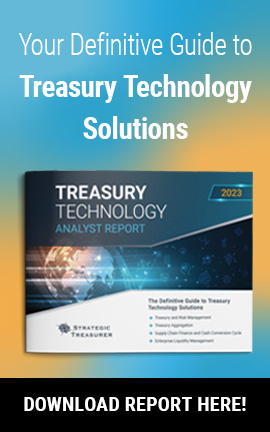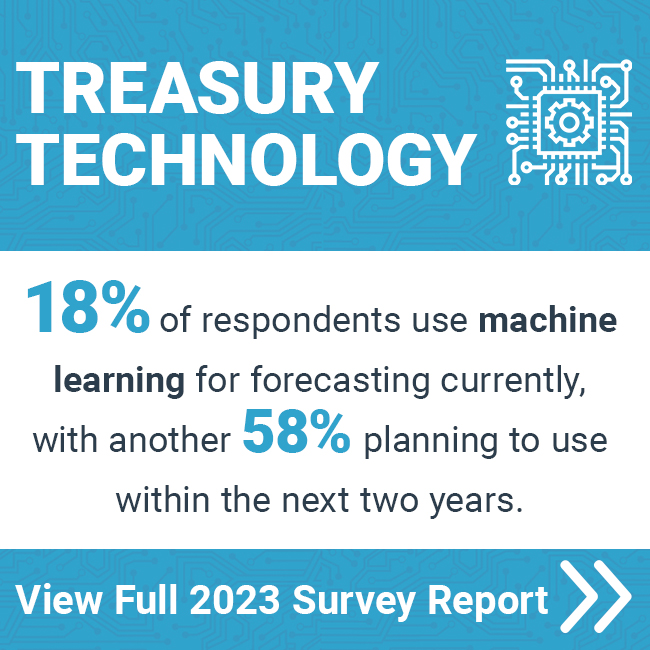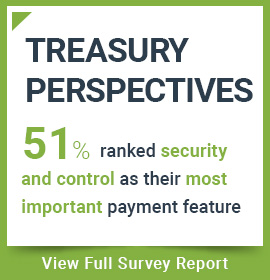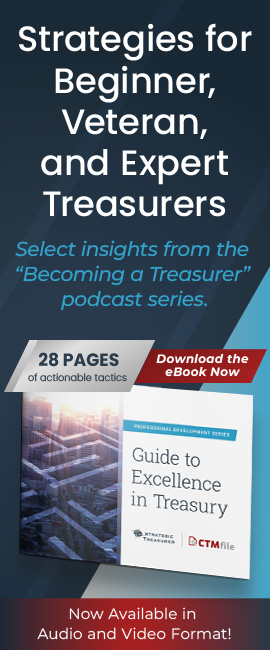
Episode 60
How to Get Stuff Done: Networking, Noise, Niceties & Nurturing Your Career
This episode details the journey of a busy treasurer juggling career navigation, skill-set maintenance, goal achievement, professional development, work/life balance and more. How does one person handle all these tasks (along with many others!), while also moving up the financial practitioner maturity model? For answers and advice, tune in to hear Lee-Ann Perkins, Assistant Treasurer at ION Geophysical, share her inspiring story and useful insights with Craig Jeffery, our podcast host and company founder. As they explore a variety of methodical and meaningful approaches to making every moment count—both in the office AND at home—be sure to follow along and learn how to better position yourself for success and fulfillment in the years to come.
Host:
Speaker:
Craig Jeffery, Strategic Treasurer
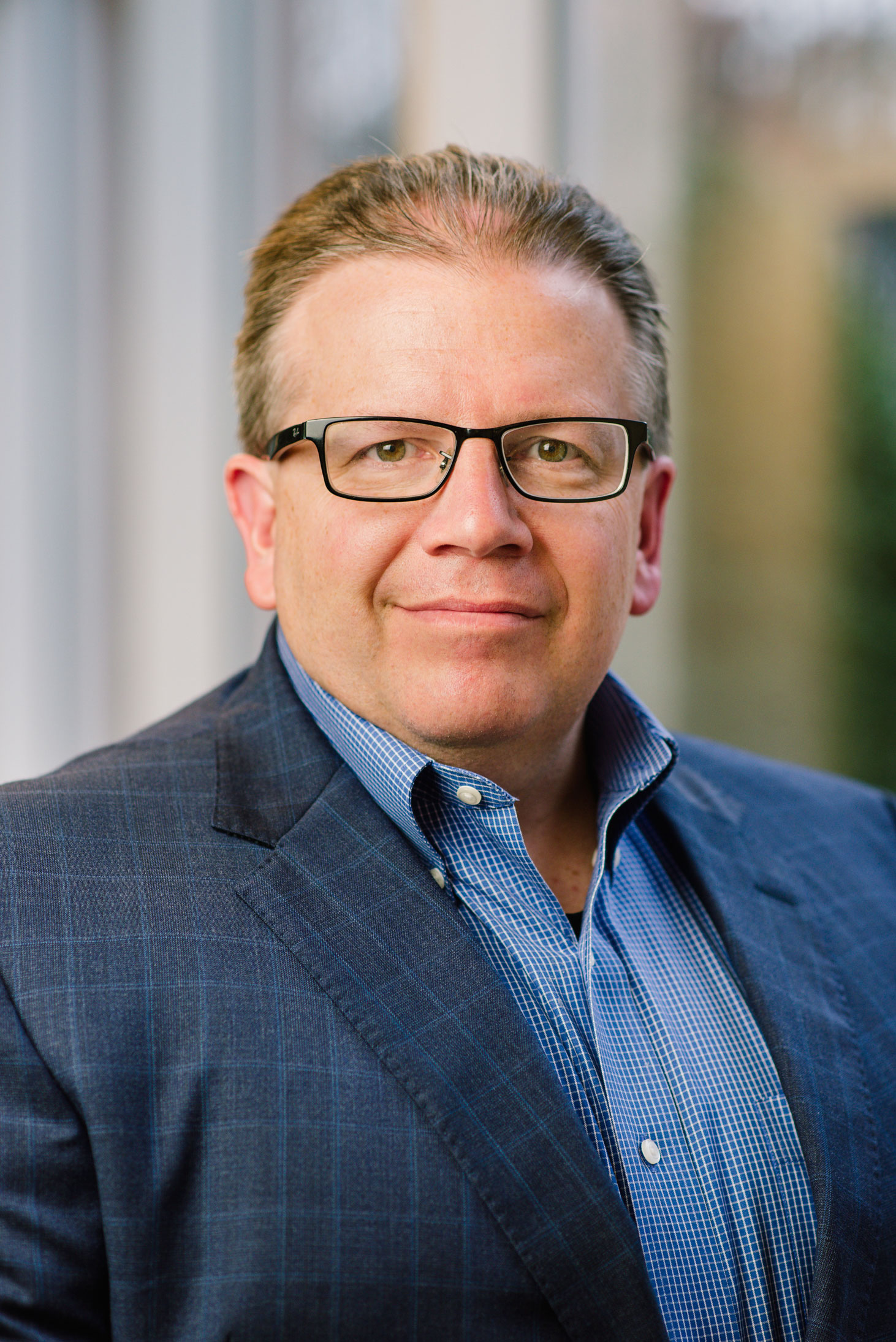

Lee-Ann Perkins, ION Geophysical
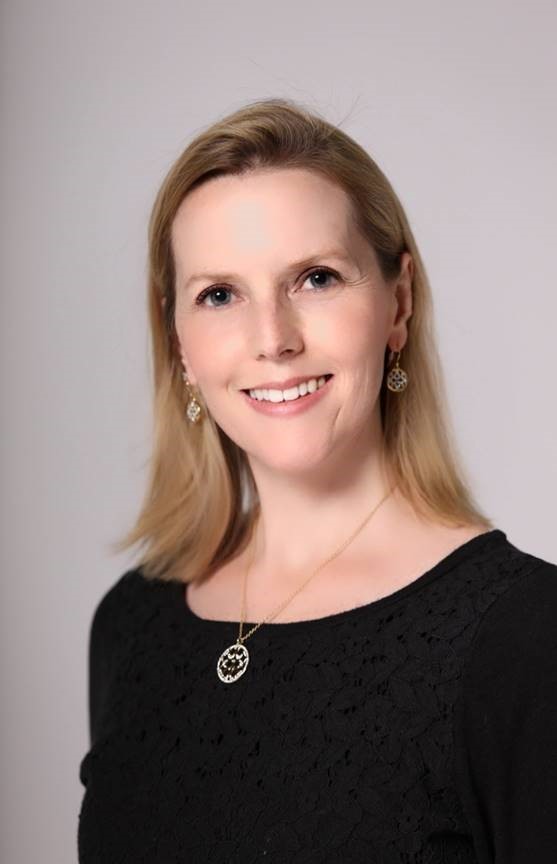

Episode Transcription - How to Get Stuff Done
INTRO:
Welcome to the Treasury Update Podcast presented by Strategic Treasurer, your source for interesting treasury news, analysis and insights in your car, at the gym, or wherever you decide to tune in.
This episode details the journey of a busy treasury professional’s career and the skills and tools used to balance work requirements and career development. Lee-Ann Perkins, Assistant Treasurer at ION Geophysical, shares how she manages to get stuff done with Host Craig Jeffery while moving up the treasury maturity model. Listen in as they explore methodical and meaningful lessons that will help position you for success both on a personal and professional level.
Craig Jeffery:
Welcome to the Treasury Update Podcast. I’m Craig Jeffery, your host for today. Today’s episode is titled How to Get Stuff Done. This is a career discussion and I am talking with Lee-Ann Perkins who’s the assistant treasurer from ION Geophysical. Lee-Ann, welcome again to the podcast.
Lee-Ann Perkins:
Thank you Craig. If I can just start, I wanted to extend my congratulations on the success of not only your podcast but your book as well and how well it’s being received in the industry and I’ve thoroughly enjoyed reading it and listening to your podcast. So, thank you for providing this to us as treasury professionals.
Craig Jeffery:
Well thank you. That was not prompted, but thank you. I’m glad people are still reading the book as well, The Strategic Treasurer Partnership for Corporate Growth, but I’ll just give everybody a little background about ION, and then, I want to get into the content.
They’re a publicly-traded company with revenues just under half a billion. They have a very significant international operation and they operate as a geo-science and seismic software solutions provider. They’ve been in business over 50 years, have about 500 employees, about one quarter of the employees have advanced degrees.
So, Lee-Ann, let’s begin. If we’re talking about how to get stuff done, you and I spoke about this a little bit before and you had a nice four repeating letters, nice alliteration, for it. So, maybe you can just tell us a little about your career as a treasury professional, and then, what are those four categories that you use to guide you to get stuff done and advance your career?
Lee-Ann Perkins:
Sure, so it was easy for me to remember four Ns, so that’s how I framed it, but when I really look back at my treasury career and how I managed to get everything done, I framework that into these four areas that stood out to me and, as the title of the podcast is, it’s networking, it’s noise, it’s niceties, and nurturing your career.
And within this framework I can talk about some of the ways, as a treasury professional with a very full plate, very high standards, and a goal to mature the treasury department, how I manage to get things done and the kind of skills and actions I take to ensure that I meet not only my goals but the goals set for me by the company, and on top of that also nurture my career at the same time.
Craig Jeffery:
One of the points that I found most interesting when we were talking about this is your view of a balance between making sure you get stuff done, the organization needs that, but not just sacrificing intellectual development, career development, bringing yourself along and bringing others along. I found that quite interesting because it seems to me that many people focus on one side or the other. They don’t balance those out so well.
Lee-Ann Perkins:
Yeah. And I think in a finance organization it tends more to be like that because you’re so data-driven and directed towards numbers and getting things right. But for me, I feel like nurturing my career, it resonates so loudly to me because, as we spoke about yesterday, this is actually my second career.
I’m 44 years old and I started my first career as a ballerina and I got injured and in my mid-twenties I had to stop dancing and figure out what else I was going to do with my life. And so, I decided I was going to focus on the other side of my brain. So, give the creative side of break and move over to the analytical side. And I got lucky enough to fall into the world of treasury, as most people who do treasury, they fall into that area.
So, I knew that if I wanted to do well in my new career, I would have to be very methodical and directed in my approach and I know what I want to do for my career and I know what I need to do to get there. And those are things like continuing education, and whether that’s formal or informal, it’s absolutely crucial to keep abreast of any areas of change in treasury because, as treasury professionals, we know it’s an ever changing arena.
And then I think you also have to build on the success you’ve already gotten and plan for the next. So, don’t rest on your laurels, make sure that you’re always planning and have a goal to get further. And then, I think you also need to critically assess your skills and your knowledge, your strengths and your weaknesses too.
And I think that’s important in your personal life as well as your professional life. And it worked for me both as a ballerina and as I continue in my treasury field that you need to make sure you’re in an area where you’re using your skills that you have and that you also have a lot of interest and passion in what you’re doing.
And if you can spend a lot of time, or say 80% of your time, in areas that are enjoyable to you, then I think you do find satisfaction in your career and that helps you to balance both working really hard at work but also having a life outside of that as well. So for me, I want to make sure that I use my talents and stay in an area where way I know I can excel in.
Craig Jeffery:
Yeah, when you mentioned that yesterday when we were talking about being a ballerina, it just made me think of all these other questions and I was more distracted, I think yesterday. I was like, “Oh, she’s a ballerina.” That’s definitely not a typical thing. So, what does ballet teach you about your career in treasury? I can think of all the funny things you’d say about that. I’m sure there’s a lot of cut-over on what you learn in different areas and how you apply it in a different situation. So, let me ask you that. What was the main thing ballet taught you about your career in treasury?
Lee-Ann Perkins:
Yeah, there’s quite a few, but I think the same attitude and perseverance that it’s taken to excel in ballet is the same skill set that’s needed to be successful in treasury because they both take enormous amounts of passion. They take discipline, it takes being dependable, it takes being agile, and you need also support to succeed.
So, I think I’ve been lucky enough to have learned that from a very young age and that helped me in my ballet career, and then, moving into a field where it’s more analytical, you can use those same sort of personality traits as a modus operandi to get what you need to get done in your treasury career. And I’m lucky enough to have been successful in both to this point using those skills.
Craig Jeffery:
Very good. So, let’s talk about the networking. The firs N that you had identified. There was networking, noise, niceties, and nurturing, nurturing your career. So, in terms of networking, how do you have success with networking, and what kind of networks?
Lee-Ann Perkins:
Yeah, so I’ll go back to what I said earlier that as a ballet dancer, we really learn to rely on each other. Especially in partnering, you had to watch each other, take visual cues from each other. And a great ballet cannot be performed alone. And so, the same can be said for a great project, or a great team, or a great company.
So, I think what I’ve learned is that you have to strategically build your network. And when you do that, you can have people who can act as your resource to help you get things done. And so, having a network is very important, but you also have to have a relationship with your network. So, it’s no good just having a thousand friends on LinkedIn, but not knowing who to go to and having a relationship with them when you need something or you need to share information.
So, I think some of the most important career moments I’ve ever had have come from networking. And one example is, I found one of my mentors years ago when I was studying for my CTP exam at a training event, and I was very interested in what he was teaching and what he’d done with his career. So, we fostered a relationship over the years and he has spent, it’s probably about 10 years now, guiding me and teaching me about banking and treasury.
So, I think some of my best moments in my career have come from networking. I’ve also found career opportunities by networking. And then, I’ve also been given numerous opportunities to do speaking engagements like I’m doing today through networking. So, I think your professional networking is really, it essentially functions as your resource.
Craig Jeffery:
Yeah, no, I think when we spoke, you had mentioned the project that we talked about on the prior episode that we did together related to forecasting. I think you had indicated you found a company through your external network on that.
Lee-Ann Perkins:
Yeah, and this was a project. So, on the last podcast we spoke about the goals I had for the year and they were A, B, C, D, also easy to remember. And the first goal was automation. And I’m the kind of person that tries to drive obsolescence where I see redundancies.
So, the first step when I assessed what we were doing as a treasury department, I saw that one of the areas for improvement I could quickly target was the cash forecasting process. And so, I had a look at it and I tried to figure out ways to do it by myself, but I realized I’m not a programmer and need help trying to get this a solution.
So, I was at the AFP conference last year and I ran into a company called DataRails and it’s a very creative and cost-effective way to solve the challenge that we had. And the requirement was to make sure the forecast was dynamically updating and not taking a full-time employee four days a week to complete from beginning to end.
So, networking at the AFP was just so fundamental to making this project a success because I don’t know how I would have found such a good product if I hadn’t been able to speak so many people and get guidance from people who, it appears that a lot of people are in the same boat with forecasting. It’s a difficult process for most companies.
So, networking has definitely helped me to achieve my goal of automation for 2019 and it’s been a real successful project. Right now, we are live, this is our second week of going live and in its infancy of this program we’ve managed to reduce an FTEs time by over 50%, so it makes me very happy that we can get these things in process and help meet the goals for the company.
Craig Jeffery:
That’s great. And it’s easy to say on a podcast that we’re going to revisit things after they’re done. So, we have done that. So, everyone listening, we do do that at least occasionally. And so, it’s good. Thanks for that update, Lee-Ann. I didn’t mean to put you on the spot on there, but I knew it tied into networking and it was interesting just to see how far along you’ve come and saving half of a full time, 20 hours a week, is quite significant. Yeah. So, after networking comes noise, what do you mean by noise?
Lee-Ann Perkins:
So, the old adage that everyone knows, “The squeaky wheel gets the grease.”? So, I feel like treasury is really vital to a company and the only way to promote its worth and its use is to really speak up wherever possible. And you can’t be that siloed department that sees activities being done that either contradict the strategy or don’t aid the end cause.
And I think for treasury, we’re in a position where we offer critical information to the company and we are tasked with being the stewards of capital and protecting the company’s assets. So, the way I think about it is that treasury has to think and act strategically.
And the way you do that is by getting a seat at the table and you’re only offered a seat at the table if you can suggest practical views and manners in which to achieve measurable results. You have to have a treasurer, I think, who’s a visionary, who thinks strategically, who’s well-respected and, when they’re invited to the table, their ideas are listened to and taken into consideration.
And I’ve seen this happen in my company where my boss is this example to me, he’s someone who does such a great job at uplifting the treasury department and ensuring we have a voice and are practical agents of change for the company. So, he makes that noise for us at the table and he’s well-respected for it. And I think he’s someone I want to emulate in that area because he really is making a change for the company and for the treasury department helping to mature us.
And then, I think the other point I want to make in noise actually comes from your book, Craig, that one of your chapters references that treasurers should be a partner to the company and not a vendor. So, my boss works really hard to make sure that we are more value-adding. We’re not just processing payments and doing cash management, but we’re actually adding value to the company and maturing us as a department to be more helpful to the company.
Craig Jeffery:
Making your voice heard. That’s the component of noise. So, we have networking, noise, and then niceties. Niceties is not a common word, but I think we all know what it means to some extent, but what does it mean in the context of treasury?
Lee-Ann Perkins:
So, I think about it in how I get things done and that success and meeting goals is often based on your ability to develop good relationships with others. When people know that you trust them and listen to them, even when you disagree with them, you can energize people around you. And a lot of good can come from these relationships.
And from the treasury’s perspective you can invite other parts of the organization to the conversation. And by that I mean operations, sales, finance, accounting, legal, and even tax. And you can use your expertise to teach others how treasury can be valuable to them and can help them in their own job.
And I have a great example of this that I can share from a couple of months ago. I asked our cash management bank, I asked them nicely to come down, and explain, and teach to our operations group how letters of credit and trade finance actually work.
And so, the bank flew down to our manufacturing facility and a group of very diverse experience backgrounds took half a day to sit and listen to a talk about letters of credit and trade finance from the experts. And we learned how to understand discrepancies that we kept getting, we learned how to fix them and, most importantly, how to avoid them going forward.
And then, this project was so well-received that a second separate event was held for management so they could also get a high-level overview of the subject. So, I think if you’re nice in the way you approach people and you want to be helpful and you want to teach people, it’s important that they understand how they can benefit from it and what’s in it for them. And I think inspiring people to act together is a shared focus. And, to me, that supersedes any individual interest.
Craig Jeffery:
So, what was in it for the organization as they heard it? Just how would you describe the benefit internally?
Lee-Ann Perkins:
Yeah, it was great because one of our manufacturing divisions was actually doing the whole LC procedure themselves. And so, they’re not treasury people. So, they just fell into this being one of their tasks. And they knew that they had to do the paperwork and get everything together, and then, send it to treasury and it went onto the bank.
And then, there was a lot of times where they either didn’t know how to do something or why it was important that letters of credit follow the exact wording of the documents, and also ways to negotiate credit contracts with customers. So, it was very helpful for the ops team to be able to see, really, the behind the scenes view of how an LC works and how they could use the correct documents, look up the Inco terms, and be able to communicate that to the customer and negotiate with the customer a better contract for both sides.
So, after we had done all this with the bank, I wrote a manual and a handbook for the ops team that we can now standardize throughout the company so that every area knows what to do and what it means to them.
Craig Jeffery:
That’s a great way to bring up a whole organization on the treasury side and make it relevant to what they’re doing.
Lee-Ann Perkins:
Yeah, I was excited by that. And I know that the guys appreciated it a lot and wherever I can insert myself to help other people, I will. Because I know treasury can do so much. We just often, not everybody knows what we do.
Craig Jeffery:
Yeah. So, that brings us to the end of our niceties. So, after networking, noise, niceties, the fourth and final N is nurturing your career. And I know you’ve talked about being methodical and practical, making sure you’re balancing things, but give us a rundown on what you’ve done to set yourself up for success making sure that it helps the organization and you.
Lee-Ann Perkins:
So, when I was starting my treasury career, I got a roadmap of what I needed to do to move from being a treasury analyst to a treasurer. What does it take? What education does it take? And what experience I needed. So, I’ve methodically worked my way through all areas of education that I can get.
Craig Jeffery:
That’s not easy because it’s not like accounting or other areas of finance where it’s more delineated. There’s not a lot of treasury degreed universities. Obviously, there’s courses that relate to it, but…
Lee-Ann Perkins:
That’s right. And so, I have an undergrad in management accounting, and then, I did the two treasury professional certifications for the US and Canada. And then, because I enjoy the compliance side of treasury, I also did a law certificate for compliance. And then, I studied my MBA.
So, I pretty much studied everything I could that had anything to do with finance and treasury to make sure I could move myself up that path. I also have to make sure that I continue my education in this field. I have a lot of CPEs that I have to complete. And so, I make sure I do those formally.
And then, I think one of the things that has really helped propel me in the right direction is seeking advice and staying connected to the right people. So, recently, for about a year now, I’ve started working with a professional coach and she helps me to nurture my career. She helps build my confidence and she helps guide me through a lot of professional challenges that come my way.
So, it’s good to have education and it’s good to have experience, but you have to use those in the right way to make sure it’s beneficial to your company and also that is beneficial to you and what you want to get out of your career as well.
Craig Jeffery:
So, you’ve had relationships, mentoring relationships in an organization and you’ve used career coaching. That’s excellent. So, that’s obviously an important part of what you think is necessary to optimize and shorten what you’re doing. Maybe it’s a combination of a personal coach when you’re working out or trying to do certain things.
Lee-Ann Perkins:
And yeah, I think mentoring, both doing it yourself and having somebody mentor you, is really important in any career. It really helps you see things from a different perspective and challenges you, and helps you solve things that you may not necessarily have the skillset or the knowledge at the moment how to deal with.
Craig Jeffery:
What’s the hardest thing for you of those four? Networking, noise, niceties, or nurturing?
Lee-Ann Perkins:
For sure it’s noise. I’m a little bit more of an introverted person, and so, it’s harder for me to just get up and make a noise about something unless I’m very well-versed in what I’m saying. And I don’t like to necessarily be the center of attention. So, I like to be behind the scenes doing a lot of the work and getting the work produced. But I don’t necessarily get out there that easily and promote myself or the treasury team.
And so, I do know that, working with my coach, that it is a skill that is developable, so you can train to be courageous. So, that’s something I’m working on this year and it’s not always easy to initiate a difficult conversation or to talk up, or to make a decision that influences others. But I know by doing it, stepping out, it grows your emotional courage and this eventually you to communicate a plan of action in an easier manner.
Craig Jeffery:
You know, as we wrap up this episode, Lee-Ann, what would be something you would want to leave the audience with? Any final emphasis or thoughts?
Lee-Ann Perkins:
Yeah, I think I would encourage people, if they want to move forward in their careers and really enjoy what they’re doing, they need to increase their engagement at work, either with your peers or with industry professionals.
I think you need to treat others well. You need to chart your own course of success and you really should work to up-skill yourself. And I think by doing this you demonstrate a proactive use of your time. And not only does this increase value for your organization, but I think it also, you can find satisfaction in your own career by doing that. At least I have.
Craig Jeffery:
Very good. Lee-Ann, thank you for talking to us about the concept of how to get stuff done, nurturing your career, networking, noise, and niceties.
Lee-Ann Perkins:
You’re welcome. Thanks for having me.
OUTRO:
You’ve reached the end of another episode of the treasury update podcast. Be sure to follow Strategic Treasurer on LinkedIn. Just search for Strategic Treasurer.
This podcast is provided for informational purposes only and statements made by Strategic Treasurer LLC on this podcast are not intended as legal, business, consulting, or tax advice. For more information, visit and bookmark strategictreasurer.com.
Related Resources
2018 Fintech HotSeat – The Future of Treasury
Live from the convention floor at the AFP Conference in Chicago, Bob Stark of Kyriba and Stephanie Villatoro of Strategic Treasurer talk about how technology is impacting treasury. Throughout this segment of the Fintech HotSeat, business intelligence and the Robotic Process Automation (RPA) are discussed and what treasury can do with the data. Watch this video for a ten-year forecast of what may come in the future of treasury technology!
23 – Working Capital Solutions
*CTP Credits Available
On this episode of The Treasury Update Podcast, Craig Jeffery, Managing Partner of Strategic Treasurer and Edi Poloniato, Global Head of Working Capital Solutions of Kyriba discuss leading practices for corporate treasury to optimize working capital with an eye to both liquidity and profit.

